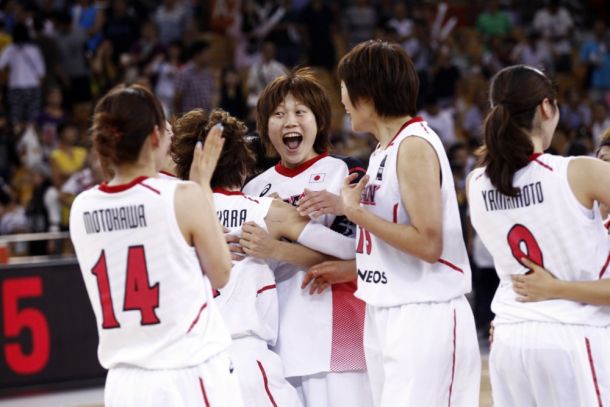They made it look easy this time.
Two years ago in Thailand, Japan won their first FIBA Asia Women's Championship in 43 years. Two years later, the defending champions had a lot more pressure attached to them, as they went to Wuhan, China to attempt to qualify for the Olympics for the first time since 2004.
They did so with relative ease.
Japan opened the tournament with a relatively sloppy performance against South Korea. Japan entered the fourth quarter of the game with a one shot lead, but went on a 13-8 run to seal the victory. Japan did not have a great game, and things would have to change if they wanted to win the tournament.
Things changed. In a huge way.
Japan crushed their next opponent, India, by a whopping 100 points. Six Japanese players scored in the double digits in that game, and it began Japan's strategy of distributing the ball among all of their players. Mio Shinozaki scored 25 of the team's 131 points in that game.
Japan routed their next opponent, Taiwan, by a score of 60-44, before playing the host nation and the team that would give them the most fits, China. China was inspired playing in front of an incredibly biased crowd, and made a late charge to nearly hand Japan their first loss of the tournament. Japan prevailed, however, and defeated China by a one point margin, 57-56. That would be the last time Japan would be challenged in the tournament. They blew out Thailand, 95-43, in their last game of qualifying before entering the semi finals.
Japan played Taiwan in the semi finals. Taiwan actually had the lead in the game entering the fourth quarter, but Japan would outpace them in the end, scoring 22 points in the final quarter for a 65-58 victory to secure a spot in the finals. Their opponent?
That's right, the team that fought them the hardest, China. This time, however, the game would be drastically different.
Japan dominated the game from the very beginning, taking a 44-22 lead at the half before pulling away and securing the championship with an 85-50 victory.
Sanae Motokawa lead the team in scoring with 13.3 points per game and a total of 93 points for the tournament. Ramu Tokashiki was next with 11.4 points per game. Japanese coach Tomohide Utsumi spread the ball around, and almost all of his players were role players in one capacity or another. In the championship game, Asami Yoshida scored 11 points to go with 5 rebounds, 7 assists, and 4 steals to be named Player Of The Game. Yoshida lead the tournament in assists. South Korea would finish with the bronze medal. Both Japan and China qualify for the 2016 Olympics in Rio.
Japan entered the tournament as the 17th ranked team in the world. They have a long way to go before they would be considered medal favorites at the Olympics, but if they play the way they played this week, anything is possible. Japan has never won an Olympic medal in women's basketball.
Hyang Jong Pak of North Korea lead the entire tournament in scoring, racking up 115 points and 19.2 points per game. North Korea entered the tournament in the Level II classification, but Pak lead them to a 5-1 record in their bracket, including a 66-50 victory over Class I opponent Thailand. North Korea will be promited to the Level I classification and qualifies for the 2017 FIBA Asia Championship.









































